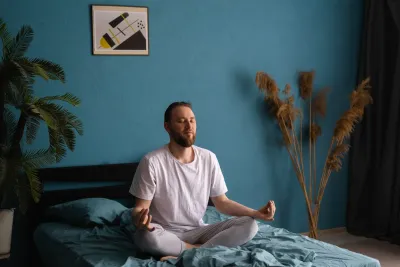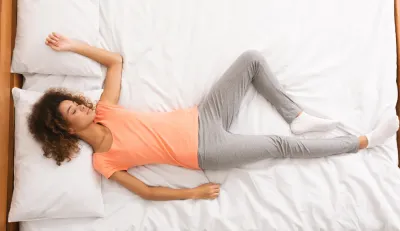
Is it me, or does it feel like so much of what you read online about the consequences of sleep deprivation focuses on its long-term impact?
It makes sense in some ways.
After all, chronic sleep loss is a major problem.
Consider the infamous case of radio DJ Peter Tripp. [1] In 1959, he went over 8 days without sleep as part of a media stunt. He suffered serious hallucinations, extreme paranoia, and psychological scars that some reported to last beyond the experiment.
What about the short-term effects though?
As anyone who’s ever pulled an all-nighter knows, even a single night of bad sleep can have very real consequences too. Important as it is to think long-term, the magic really happens when we start protecting each and every night.
What Are the Symptoms of Sleep Deprivation
Have you been feeling tired and groggy lately, even though you've been getting a full night's sleep? It might be because you're experiencing sleep deprivation. This is a common condition that occurs when you don't get enough quality sleep, and it can have a range of symptoms that affect your physical and mental health.
Below is what happens after just one night of poor sleep…
Fatigue
The first and most obvious effect is on your energy levels. Depending on the extent of the deprivation, you might feel general tiredness throughout the day.
Your body feels heavy, your mind feels slow, and keeping your eyes open can seem impossible. All you really want to do is lie down in bed, curl up under the covers, and catch up on some rest.
In worst-case scenarios, fatigue caused by sleep loss can lead to mistakes and ensuing accidents. Fun (if you can call it that) fact: alongside other infamous disasters, this contributed to the 1986 nuclear disaster at Chernobyl [2], where the operators were reportedly sleep-deprived.
Recent Study: Researchers have found that just two nights of disrupted sleep can significantly make people feel years older. The study highlights the importance of consistent, restful sleep in maintaining a sense of youthfulness and staving off the sensations of aging.
Lack of Focus
Your ability to focus suffers when you’re that tired too. Concentrating fully on daily tasks becomes a chore, which makes everything take ten times longer than it probably should. As the composer, John Cage once said, “Sleep’s what we need. It produces an emptiness in us into which sooner or later energies flow.”
Irritability
Remaining calm and patient takes energy that you don’t always have after a poor night’s sleep. That’s why it’s so much harder to keep your emotions in check.
Like a toddler having a tantrum, there’s no filter anymore. As this study from Iowa State University showed, any anger that you’d usually be able to control rises straight to the surface. Even after a few hours less sleep than usual, your likelihood of becoming snappy, grouchy, and difficult to be around can increase.
Without it, it’s as if your mind’s shrouded in a thick fog; finding solutions to mental problems is like wading through mud. Your short-term memory, attention span, and general cognition are all impaired.
Anxiety
In a recent University of Berkeley study, 18 healthy adults went without sleep for a single night. The next day, they showed a 30% increase in anxiety levels. The study concluded with, “Our findings emphasize sleep as a novel therapeutic target for the amelioration of anxiety in non-clinical and clinical populations.” [3]
Another interesting finding comes from their brain scans, which showed their amygdalae firing on all cylinders, yet relatively little activity in their medial frontal cortices. Given that the amygdala controls our fear response and the frontal cortex regulates emotions, this points to the idea that sleep loss can wreak havoc on our emotional lives!
Below are various breathing and stretching exercises to help reduce stress and anxiety. You can use this exercise anytime you find yourself needing to relax and re-center.
Yoga Exercises for Stress and Anxiety
- 3-minute Bedtime Yoga
- 3-minute Midday Yoga Stretching
- 10-minute Midday Stretching
- 5-minute Outdoor Yoga
Meditation for Stress and Anxiety
Food Cravings
Did you know that people who sleep less than 6 hours each night tend to have a higher BMI than those logging above the 6-hour nightly mark?
It sounds crazy, but it’s because our bodies release hormones that, among other things, help suppress our appetite. In other words, you’re more likely to get the munchies if you don’t sleep enough.
Read More: Food and Drinks That Can Help You Sleep
Final Thought
Knowing about the long-term ramifications of sleep loss is all well and good.
When it comes to sleep health, though, the best approach is to take it a night at a time. You’ll avoid everything from the unhelpful fall-out of a single poor sleep to the most debilitating effects of chronic sleep deprivation.
Citations/References
[1] Psychology Case Study: Peter Tripp & Sleep Deprivation. (2020, June 22).
[2] Short On Sleep? You Could Be A Disaster Waiting To Happen. (2015, May 12). View Resource
[3] Anwar, Yasmin. “Poor Sleep Triggers Viral Loneliness and Social Rejection.” Berkeley, 2022.







